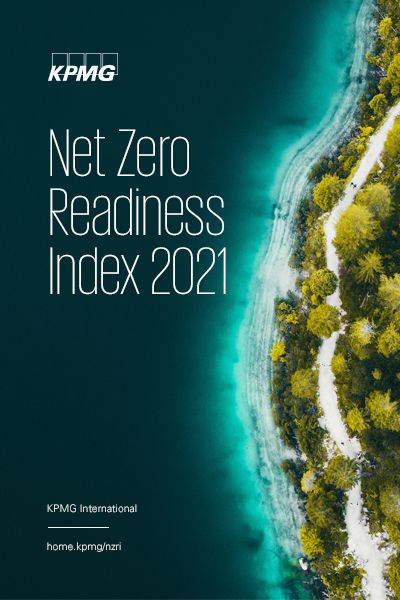NZRI key observations
Countries are lagging in adopting Net Zero targets and signing them into law. The 32 countries in the NZRI are responsible for around three-quarters of global emissions. Only nine of them, together accounting for around 10 percent of emissions, have made legally binding Net Zero commitments. Another 10 countries accounting for 43 percent of emissions have set targets but have not implemented legal mechanisms. The remaining 13 countries, accounting for 24 percent of global emissions, have not yet adopted any form of national Net Zero target.
A lack of delivery capability is the weak point in global Net Zero ambitions. KPMG's analysis reveals that Net Zero delivery capability is largely lacking in many countries, including some high income countries. Those countries with a Net Zero target, legally binding or in policy, demonstrate stronger delivery capability.
National preparedness is largely mirrored in sector readiness. In most countries, the level of Net Zero preparedness on the national level is mirrored by the level of readiness in the five key sectors of electricity and heat, industry, transport, buildings and agriculture, land use and forestry.
Readiness to achieve Net Zero is linked to prosperity. The Index shows a clear correlation between national preparedness to achieve Net Zero and economic prosperity. This makes it critical that richer countries that have made progress on decarbonization support poorer ones in improving their Net Zero readiness.

KPMG insights
Compiling the NZRI has involved speaking to a wide range of KPMG specialists working at an international level as well as in each of the 32 participating countries. The following insights on global Net Zero transition are based on their observations.
Setting a Net Zero target is only the first step. It is also critical for governments to clearly set out strategies and actions through which they intend to deliver their Net Zero ambitions including milestones and interim reduction targets, as well as economy-wide mechanisms such as carbon taxes and emissions trading.
Governments need to harness the power of the financial markets to deliver Net Zero. Investors and banks are increasingly factoring climate risk and Net Zero transition into their investment and lending decisions, with escalating growth in climate-related financial products. Governments can support this with measures such as carbon pricing.
Introducing mandatory reporting for businesses will help to accelerate Net Zero transition. Making such disclosures mandatory, such as the UK and New Zealand have done, accelerates the availability of the data investors and lenders rely on to make greener investment and lending decisions.

Political alignment and collaboration at all levels is powerful. European Union policies have shown how supra-national alignment can advance decarbonization across jurisdictions. But many countries do not align action at national and sub-national levels, with states and cities often being more agile than national governments.
Building public support for climate action should be a key focus for governments. Support for climate action is increasing but opposition remains. Policymakers need to clearly communicate other benefits of policies to the public, avoid unfairly disadvantaging low- and middle-income consumers and support workers in high carbon sectors.
Ongoing geopolitical tensions have the potential to turn Net Zero into an arena of climate competition, rather than cooperation. The global reaction to the European Union's proposed carbon border adjustment mechanism will not be the only clash between campaigners and those looking to protect carbon intensive assets and related jobs.
Get in touch
Argentina | Australia | Brazil | Canada | Chile | China | Denmark | France | Germany | Hungary | India | Indonesia | Italy | Japan | Malaysia |
Mexico | New Zealand | Nigeria | Norway | Poland | Russia | Saudi Arabia | Singapore | South Africa | South Korea | Spain | Sweden | Thailand |
Turkey | United Arab Emirates | United Kingdom | United States



